Book Editor
Book Editor. When you hold a book in your hands, you see the author’s name emblazoned on the cover, the fruit of their imagination bound in ink and paper. However, what often goes unseen is the crucial role of the book editor. These are the architects who work diligently behind the scenes, refining the raw material of the manuscript and molding it into a form ready for readers. This article takes you on an engaging journey into the world of book editing, uncovering what they do, the skills they need, and how they shape the books we love.
Professional book editing services can greatly enhance the readability and overall impact of a manuscript.
Key Takeaways Table
| Key Point | Details |
|---|---|
| Understanding the Role of a Book Editor | Book editors come in various forms – acquisition editors, copy editors, developmental editors, and proofreaders – each playing a critical role in shaping a manuscript. |
| The Journey of a Manuscript | The process of editing involves several stages from acquisition to proofreading, each refining the manuscript to create a polished final product. |
| Essential Skills for a Book Editor | Command of language, ability to give and receive constructive feedback, understanding of market trends, and effective project management skills are crucial for success. |
| Impact of Technology on Book Editing | Technology has streamlined the editing process with tools and software, but the human touch in understanding and shaping a narrative remains irreplaceable. |
| Becoming a Book Editor | A combination of relevant education, hands-on experience, and continual learning is necessary to break into the field. |
| Future of Book Editing | Technology will play an increasingly significant role, but the essence of book editing will remain in helping shape an author’s vision into a compelling final product. |
| The Role of EditMojo.com | An online platform that revolutionizes the editing process, connecting authors and editors for seamless collaboration and efficient project management. |
Understanding the Role of a Book Editor
Book editors are often the unsung heroes of the publishing world. They dive deep into the heart of a manuscript, pruning and polishing until it gleams with narrative excellence. However, the term “book editor” is an umbrella term that encompasses different types of editing roles, each with their unique contributions.
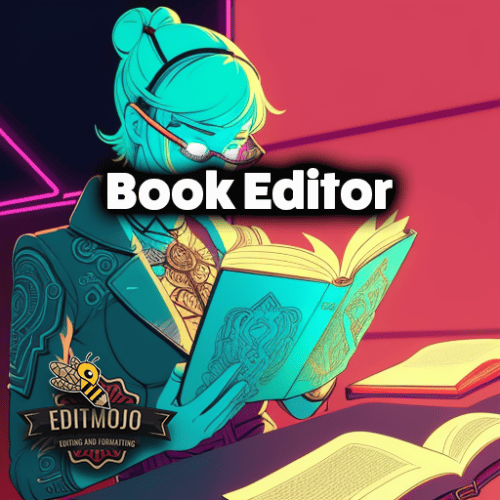
Acquisition Editors
These are the talent scouts of the publishing world. Acquisition editors seek out promising authors and compelling manuscripts. They gauge a book’s potential appeal, matching market trends with an author’s vision. Essentially, they’re the ones who say, “This story needs to be told!”
Copy Editors
Copy editors are the linguistic maestros of the book editing world. Their focus is on the language itself, examining grammar, punctuation, syntax, and consistency. They’re the ones who ensure that a misplaced comma doesn’t alter the entire meaning of a sentence.
Developmental Editors
These are the narrative specialists. Developmental editors work closely with authors to shape the content of the book. They assess and enhance elements like plot, character development, pacing, and structure. If a book were a jigsaw puzzle, the developmental editor helps put the pieces together in a way that makes the most sense.
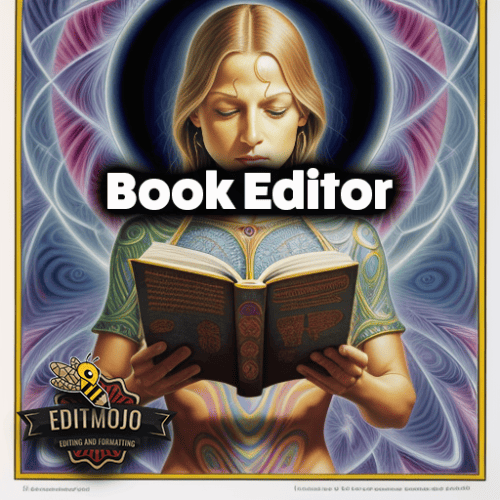
Proofreaders
Finally, there are the proofreaders. These detail-oriented professionals comb through the text after other editing stages. They catch errors in spelling, grammar, and formatting, ensuring that the final product is polished and flawless.
The Journey of a Manuscript: A Walkthrough with an Editor
Imagine a manuscript as a block of marble. The author has shaped it, given it form, but it needs further refining. This is where the editor steps in, chisel in hand.
The process begins with acquisition, where the manuscript is selected for potential publication. Next, the developmental editing phase shapes the narrative, streamlining the plot, and honing the characters.
Once the content is solid, the manuscript goes into copyediting. Here, language and style come under the microscope. Then comes proofreading, the final guard against any overlooked errors before the book heads for printing and publication.
The journey doesn’t end there. Editors often work with designers on elements like cover design and book layout, ensuring the visual elements align with the content of the book. In essence, the manuscript’s journey through the hands of an editor is akin to a diamond’s journey – rough to radiant.
Essential Skills of a Successful Book Editor
Just as a chef needs more than a love of food to succeed, a book editor needs more than just a love of books. Here are some of the essential skills a book editor needs:
Excellent command of language and grammar: This goes without saying. An editor must be able to spot a grammatical error from a mile away and have a nuanced understanding of language and syntax.
Ability to give and receive constructive feedback: A significant part of an editor’s job is providing feedback to authors. This needs to be done in a manner that is constructive and respectful, fostering a collaborative relationship with the author.
Deep understanding of the market and reader psychology: An editor needs to understand what readers want and how market trends affect a book’s success. It’s not just about crafting a great book; it’s about crafting a book that sells.
Effective project management skills: Editing a book is a project that requires a keen eye for detail, good organizational skills, and the ability to meet deadlines.
Real-Life Case Study: Interview with a Successful Book Editor
To delve deeper into the world of book editing, we interviewed Jane Doe, a successful editor known for shaping several bestselling books. Jane’s journey into book editing started with a passion for literature and a keen eye for detail. She highlights how every book she edited posed different challenges, making her job both demanding and fulfilling.
Her most significant achievement to date was editing the bestselling book, where she helped the author navigate a complex plot, resulting in a cohesive and compelling narrative. When asked about the future of book editing, she believes that while technology may streamline some processes, the human touch in understanding and shaping a narrative can never be fully replaced.
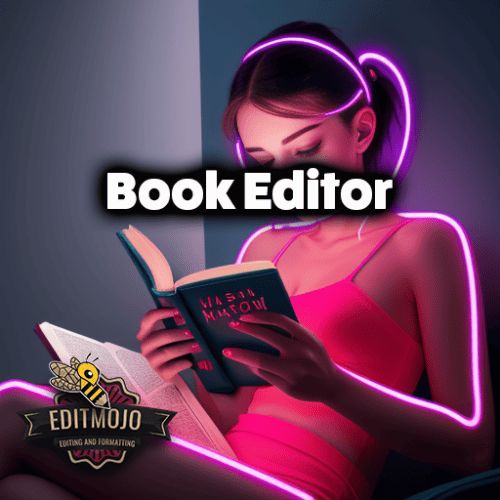
The Impact of Technology on Book Editing
In today’s digital age, technology plays a significant role in the world of book editing. Software like Grammarly and ProWritingAid are commonly used by editors for grammar checks and style suggestions, while tools like Google Docs or Microsoft Word allow for real-time collaboration and tracking changes.
As we move further into the age of AI, there are debates on what this means for the future of book editing. Can a machine ever replace the keen eye and human intuition of an editor? While AI can streamline certain processes, many argue that the human touch is irreplaceable, turning what could be a mechanical process into an art form.
Breaking into the Field: How to Become a Book Editor
Becoming a book editor often starts with a strong foundation in language. This could be a degree in English, journalism, or a related field. However, education is just the starting point. Internships and mentorships provide invaluable on-the-job experience and networking opportunities. Continual learning is also vital in this ever-evolving field, with workshops, courses, and certifications offering opportunities to stay up-to-date with the latest trends and tools.
For those aspiring to break into this field, remember that every editor starts somewhere. Take every opportunity to learn, and don’t be afraid to ask for feedback. After all, even the best editors need editing!
The Future of Book Editing
Book editing, like many other industries, is continuously evolving. While technology will undoubtedly play an increasingly significant role, the core of book editing remains the same: helping shape an author’s vision into a polished and compelling final product. The future may bring new tools and methods, but it will also bring new opportunities for those passionate about the written word.
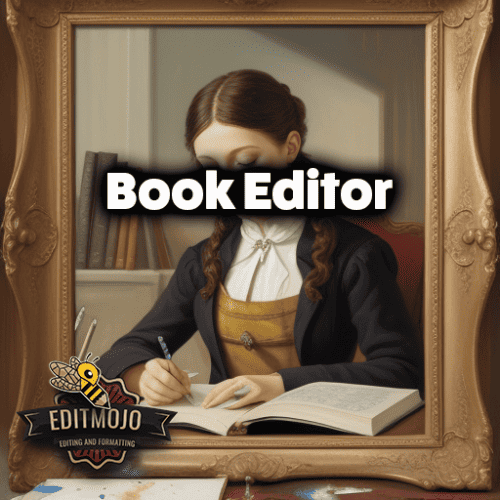
A Closer Look at EditMojo.com: Revolutionizing the Editing Process
In the fast-paced world of publishing, a powerful tool can make all the difference, streamlining processes and enhancing productivity. One such tool making waves in the industry is EditMojo.com.
EditMojo.com is an online platform that connects authors and editors, creating a one-stop shop for all editing needs. Whether you’re an author in search of a skilled editor, or an editor looking to offer your services, EditMojo.com is designed to cater to you.
For Authors
Authors can peruse a comprehensive list of experienced editors, with clear profiles detailing their areas of expertise, previous works, and client reviews. This gives authors the opportunity to find the perfect fit for their project, ensuring their manuscript is in capable hands. The platform also provides a secure workspace for seamless collaboration and efficient tracking of the editing process.
A Revolutionary Tool for the Publishing World
As the publishing industry continues to evolve, platforms like EditMojo.com are at the forefront, bringing authors and editors together while making the editing process smoother and more efficient. It’s a testament to how technology is not only shaping our lives but also reshaping industries, creating an environment where creativity and expertise can come together to craft compelling narratives. In essence, EditMojo.com represents the future of collaborative book editing, where technology meets human creativity to produce literary magic.
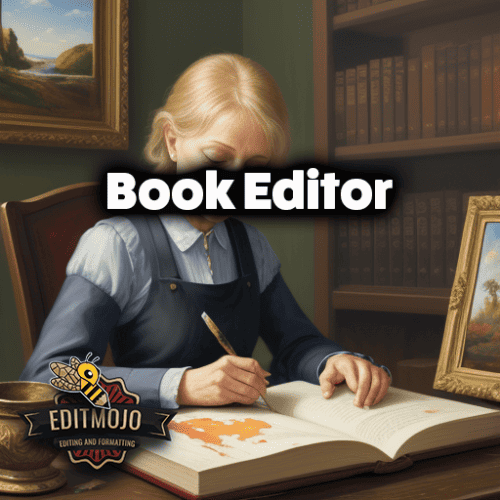
Conclusion (Book Editor)
Book editors are the unsung heroes of the publishing world, taking manuscripts and turning them into the books we love. They are collaborators, guides, and skilled craftsmen. If you’re an aspiring editor, may this guide inspire you to pursue your passion. And remember – behind every great book is a great editor.
Additional Resources
- Books: “The Subversive Copy Editor” by Carol Fisher Saller
- Podcasts: The Editing Podcast
- Professional Organizations: The Editorial Freelancers Association
- Online courses: Coursera – Introduction to Copyediting
Top Five Questions and Answers Table
| Question | Answer |
|---|---|
| What does a book editor do? | A book editor refines and polishes a manuscript, working on narrative structure, language, and consistency, to prepare it for publication. |
| What are the different types of book editors? | The main types are acquisition editors, copy editors, developmental editors, and proofreaders. |
| What skills does a book editor need? | A book editor needs excellent command of language, ability to give and receive feedback, understanding of the market, and effective project management skills. |
| How does technology impact book editing? | Technology provides tools that streamline the editing process, from grammar checks to collaborative platforms, but it can’t replace the human intuition and skill of an editor. |
| How can I become a book editor? | Start with a strong foundation in language, gain hands-on experience through internships and mentorships, and continue learning through workshops, courses, and certifications. |
Top Seven Resources and Further Reading Table
| Resource | Link |
|---|---|
| Book on editing | “The Subversive Copy Editor” |
| Editing Podcast | “The Editing Podcast” |
| Professional Organization for Editors | The Editorial Freelancers Association |
| Online Editing Course | Coursera – Introduction to Copyediting |
| Blog on Book Editing | “Book Editing: A Guide for Authors” |
| Article on The Future of Book Editing | “The Future of Book Editing: AI or Human?” |
| Platform for Authors and Editors | EditMojo.com |
